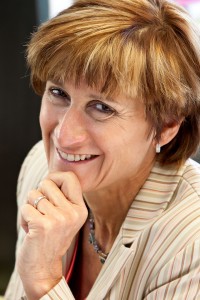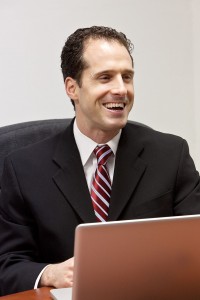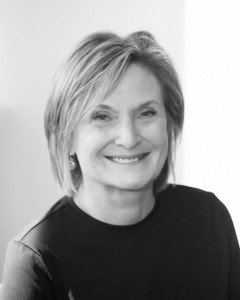
With her customary candor and humor, Susie Feldman often describes herself as a “recovering tax attorney — with emphasis on recovering.” As Senior Development Manager on staff at the Jewish Federation, Susie is an advisor and steward to donors who make long-term financial commitments to the community, a role that requires absolute trust, as well as the skills, confidence and know-how of an attorney.
Like many ex-attorneys in community work, Susie entered law school thinking that she could make a difference in the world. “As the child of Holocaust survivors, I originally hoped to work with Simon Weisenthal as a Nazi war hunter. Unfortunately, I do not speak German and war criminal hunting was out of the question. So what’s the next closest thing to that profession you ask? An LLM in Taxation!”
As a single mother of three, Susie practiced law as an an estate planning attorney. The job put food on the table, but did not provide satisfaction. She remarried and joined Federation where she’s worked her brand of magic for six years. “It is easy to be passionate about an organization when you have seen how it changes lives.”
Susie’s career pattern is not uncommon. Lawyers who leave the profession after a stint in practice tend to reinvent themselves in creative ways, motivated by a desire to find both personal fulfillment and meaningful work towards the greater good of the community.
Why lawyers leave and where to?
If you’re a lawyer working “outside the law,” you’re in good company. Ex-lawyers are legion in every field. With their proclivity for social action, advocacy, organization, policy-making, problem-solving, communication – and debate – lawyers in practice – as well as lawyers “out of practice” abound in businesses of all stripes, financial and real estate development, entrepreneurial startups, fundraising, philanthropic and volunteer organizations, and not surprisingly, in Jewish agencies.

“I knew from the start that I was interested in nonprofit work,” says Jodee Fishman Raines, former director of The Jewish Fund and current Vice President of Programs at the Erb Family Foundation. “I worked for The Skillman Foundation before law school, and after a few years of practicing law in Detroit realized my true passion, the place where I could have the most impact on the City’s revitalization was philanthropy. My legal training certainly has helped me through, and the eight years I devoted to law school and practice were years well spent.”
Reflecting on his career path back to Detroit, Harry Reisig considers his law degree to be an instrument of change. “I went into law school as I saw it as the most effective and pragmatic way I could have a real impact on improving society,” he says. “Together with my Masters in Criminology, it provided a framework and opportunities to begin to tackle what many see as the most challenging civil right use of our generation, mass incarceration, particularly of minorities. I embraced the opportunity to draw on my broader life experience in sales, counseling and the food business back here in Detroit to develop a new model of programming for returning citizens, Replanting Roots.”
Replanting Roots is a new model for re-entry, where citizens returning from prison have the opportunity to develop the skills, spirit and support network they will need to start new green businesses.

“You can do anything you want with a law degree,” says Marty Maddin, who runs his own coaching business in Detroit. “What they don’t tell you in law school is that you come out a lawyer! Law school is designed to mold you into a practicing attorney, not help you explore alternative careers. You can get stuck in the machinery and forget why you came to law school in the first place. Once you get out of school and go into practice, making a career leap gets even harder.”
Prior to starting his business, Maddin practiced law as a commercial real estate and corporate attorney. “I have an understanding and respect for the profession because of my family history. I see how my father (Michael Maddin) successfully, confidently and morally navigates the world through his practice.”
“I chose a different path when I realized I wasn’t playing to my strengths and passion working as an attorney. As a business and leadership coach, I’m able to affect change on a more personal level.” With no shortage of outlets for his considerable energies and talent, Maddin, an avid community volunteer, recently has been elected President of Federation’s NEXTGen Detroit.
You have to make choices
Ned Greenberg, President of DataNet Quality Systems, an international software company in Southfield, Michigan, stresses the importance of making choices. It was not for lack of interest or challenge that Greenberg returned to Detroit from Washington, D.C. As a young attorney, he worked in the Department of Justice under the tenure of Janet Reno and assisted the Attorney General in the congressional hearings on the Branch Davidian case.
“I wouldn’t say I’m a lawyer in exile. I’ve always loved the practice of law and have never really turned away from the profession, Greenberg explains. “I was lucky to have the opportunity to join a family business.”
“The way the legal profession works, happenstance can all too often decide for you what direction your career will take. I think it’s important to affirmatively choose what you want to do. I have a nephew in law school today, and my advice to him is to pay attention to what he finds enjoyable and deliberately follow that path to a career he will find rewarding.”
The advantages of a legal background
Many will concur that a law degree can provide a leg-up in running a business. Mark Lewis, owner of Community 1st Development and Neighborhood Housing Solutions, spent the first few years of his career “trying to learn to be a good lawyer” until his stepfather invited him into the real estate business.
“That was over 25 years ago, and while the current real estate market has been in an abysmal funk, I still love what I do,” Lewis says, “whether it’s developing and building affordable green housing to rebuild and revitalize distressed neighborhoods or managing the day-to-day problems of a property management company. The training and discipline that I had in law school has been an invaluable tool. Although I do not represent myself (who wants a fool for a client), my approach to solving problems and dealing with sticky situations has been shaped by my law school training.”

Roz Blanck, a long-time volunteer in the community and newly elected Campaign Chair of Federation’s Women’s Department, would agree that having a law degree has proven to be an invaluable asset in her work for a wide range of Jewish nonprofits. Blanck is one of the founders of Bookstock, the Used Book and Media Sale to benefit education and literacy programs in Metro Detroit. Noting that Bookstock co-founders Paula Glazier and Jodi Goodman are also “non-practicing attorneys,” Blanck observes, “Bookstock has grown into a year-round business. Certainly, our collective legal background has worked to our advantage, affording us the tools, skill set and confidence to manage 700 volunteers, and navigate the complexity of the contracts involved in running the event.”
“I have no regrets about my choice to leave the active practice of law in favor of the work I’ve done for 18 years at the Jewish Federation,” says Jonathan Lowe, Associate Director of the Jewish Community Endowment Fund. “I use my legal training every day on the job, counseling donors, meeting with donors and their counsel, helping to raise endowment resources for the benefit our Jewish community.”
More “lawyers on the loose” working for the greater good of the community
Jeff Aronoff, Owner, D:Hive
Leor Barak, President, Isaac Agree Downtown Synagogue
Aaron Chernow, Chief Executive Officer, Brightwing (recruiting), Board Member JVS
Ben Falik, Director, Repair the World
Jordan Field, Detroit Tigers Foundation
Debbie Grossman, Campaign Department, Jewish Federation
Jodee Fishman Raines, former director of the Jewish Fund, current director of the Erb Foundation
Helen Katz, Director, Jewish Women’s Foundation
Linda Klein, member Federation Board
David Schostak, Real Estate Developer
Brian Siegel, President, Jewish Community Center
Dona Stillman, community leader and volunteer
Steve Tobocman, Former State Representative, current public policy guru




